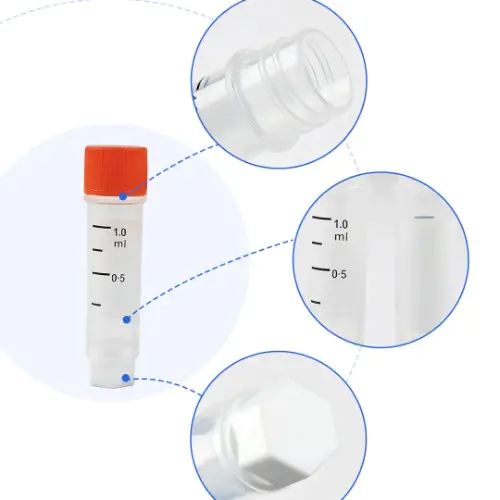In the realm of bioscience and clinical research, maintaining the integrity and security of biological samples is paramount. Selecting the right cryogenic vials can make a significant difference in preserving samples under extreme conditions. When sourcing from a trusted cryovials supplier, laboratories ensure consistent quality and reliability in their sample storage solutions. The AMNGENT Traditional Cryogenic Vials, available in sizes ranging from 0.5ml to 5ml, offer a versatile option for various sample volumes. These vials are crafted from medical-grade polypropylene and are designed to withstand temperatures from -196°C up to 121°C, making them ideal for nitrogen canister storage. Their E-beam sterilization ensures they are RNase, DNase, and endotoxin free, which is critical for sensitive molecular biology applications. Choosing high-quality Cryogenic Vials reflects a commitment to sample security, facilitating accurate research outcomes and long-term viability.
Table of contents:
Critical Performance Metrics to Assess in Cryovials 0.5ml
How to Vet a Cryovials Supplier for Consistency and Reliability
The Impact of Cryogenic Vials on Long-Term Sample Viability
Handling and Storage Protocols for Cryogenic Vials in Clinical Settings
Assessing the performance of 0.5ml cryovials requires a focus on several key parameters. First, the material composition is crucial; medical-grade polypropylene used in AMNGENT vials ensures durability and chemical resistance. The vial’s ability to maintain a hermetic seal under cryogenic temperatures prevents contamination and sample evaporation, which is essential for preserving sample integrity. The external thread design with flat caps provides easy handling and secure closure, reducing the risk of leaks during storage or transport. Another important metric is the vial’s compatibility with standard cryovial boxes; the 0.5ml and 1.5ml sizes fit perfectly into 100-well boxes, facilitating organized sample management. Additionally, color-coded caps available in seven options enhance sample identification and reduce errors. Sterility certifications and endotoxin-free status guarantee that the vials do not introduce contaminants, an essential factor for clinical and research applications. Evaluating these metrics ensures the selection of cryovials that meet rigorous laboratory standards.

Choosing a reliable cryovials supplier is foundational to securing consistent product quality and dependable supply chains. The vetting process begins with verifying the supplier’s certifications, such as ISO9001, ISO13485, FDA, and CE, which indicate adherence to international quality management standards. Zhejiang Rongda Biotechnology Co., Ltd., the manufacturer of AMNGENT Traditional Cryogenic Vials, exemplifies such compliance, reinforcing trust in their products. Evaluating the supplier’s production capabilities and quality control measures is also essential; suppliers that implement stringent testing for sterility, material purity, and mechanical strength reduce the risk of batch-to-batch variability. Customer testimonials and export reach provide insight into the supplier’s market reputation and service reliability. Furthermore, the availability of diverse vial sizes and cap options, as offered by AMNGENT, demonstrates the supplier’s ability to meet varied laboratory needs. Ensuring prompt delivery and responsive customer support completes the vetting process, guaranteeing that laboratories maintain uninterrupted access to high-quality Cryogenic Vials.
Long-term sample viability hinges on the quality and performance of the cryogenic vials used for storage. Vials like the AMNGENT Traditional Cryogenic Vials are engineered to withstand ultra-low temperatures without compromising structural integrity. Their robust polypropylene construction resists cracking or deformation during freeze-thaw cycles, which could otherwise jeopardize sample containment. The secure sealing mechanism prevents contamination and moisture ingress, critical for preserving nucleic acids, proteins, and cells over extended periods. Additionally, the vials’ compatibility with nitrogen canister storage at temperatures as low as -196°C ensures that samples remain stable and biologically active. The availability of multiple vial volumes allows precise aliquoting, minimizing freeze-thaw damage by reducing repeated sample handling. Color-coded caps and standardized packaging facilitate efficient sample tracking and retrieval, reducing the risk of misidentification. Ultimately, investing in premium Cryogenic Vials directly supports the reliability of long-term biobanking and clinical sample preservation.
Proper handling and storage protocols are vital to maximize the performance of Cryogenic Vials in clinical environments. Before use, vials should be inspected for any manufacturing defects and verified for sterility. When filling, it is important to avoid overfilling to prevent cap deformation and ensure a secure seal. AMNGENT vials’ external thread design with flat caps allows for easy manual capping while maintaining airtight closure. During storage, vials must be placed in compatible cryovial boxes, such as the 100-well or 81-well boxes designed for specific vial sizes, to ensure stability and prevent sample loss. Labeling with cryogenic-resistant labels and color-coded caps enhances sample traceability. When retrieving samples, minimizing exposure time to ambient temperatures is crucial to prevent thawing and degradation. Additionally, adhering to temperature ranges from -196°C to 121°C as specified by the vial manufacturer preserves vial integrity. Following these protocols in clinical settings safeguards sample quality and supports accurate diagnostic and research outcomes.
In conclusion, securing biological samples with high-quality Cryogenic Vials is an indispensable aspect of modern bioscience and clinical research. The AMNGENT Traditional Cryogenic Vials, offered by a reputable cryovials supplier, combine robust material quality, versatile sizing, and reliable sealing mechanisms to meet stringent laboratory demands. Evaluating critical performance metrics such as material composition, seal integrity, and sterility ensures that laboratories select vials capable of preserving samples under extreme conditions. Vetting suppliers for certifications and consistent quality further guarantees dependable supply and product reliability. The impact of these vials on long-term sample viability cannot be overstated, as they protect against contamination and physical damage throughout storage. Finally, adherence to proper handling and storage protocols in clinical settings maximizes the benefits of these advanced cryovials. Investing in premium cryogenic storage solutions ultimately enhances sample security, research accuracy, and clinical effectiveness.